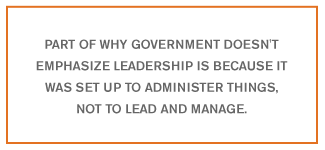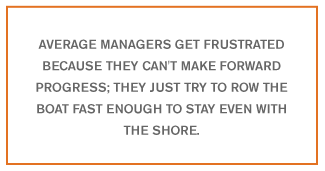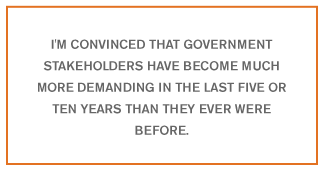In the United States, we like to imagine that government agencies look for leaders who know more, see further, and plan better than we do -- that federal managers deftly use their power and responsibility to make complex decisions that affect us all in ways we can't comprehend.
 |
Well, they don't. More precisely, they are prevented from doing so. Though the U.S. government has world-class leaders and managers, its management framework resembles that of the factories of a century or more ago. That sort of structure was designed to handle tasks typical of mass production, such as administering work orders and overseeing repetitive tasks. But it isn't necessarily suited to today's knowledge-driven, service-oriented economy, which demands nimbleness and innovation.
That's why the U.S. government often seems bureaucratic, unresponsive, and mired in hierarchy. What the government needs are leaders and managers with the resourcefulness to do more with less money and fewer people and with greater responsiveness to stakeholders.
So says Mike Mears, a consultant on leadership and organizational change who recently retired from the Central Intelligence Agency as its Chief of Human Capital. Mears is both an expert on government and a lifelong student of leadership, and he's seen the government from both sides of the red tape.
Mears is the first to affirm that many government workers are among the most driven, mission-oriented, and intelligent employees in America -- but too often, their hands are tied by a hierarchy that stymies real leadership. In this candid interview, Mears discusses what he's seen in the highest offices in government, why the government's structure is designed along outdated principles that don't function well today, and what can be done to create the government we need now.
GMJ: How would you characterize leadership in the U.S. government?
Mears: We have some great leaders in government, but not enough of them, particularly in our supervisory ranks, which is the critical edge where management meets employee. Part of the problem is that we tend to select more for technical skills than leadership attributes, we don't provide sufficient leadership training, and we don't provide an overarching leadership philosophy about how government should treat employees to stimulate their performance. More often than not, we just throw a new supervisor into the toughest job in management and hope he or she figures it out. And when we do it that way, it's almost always at the cost of employees' development and performance.
Part of why government doesn't emphasize leadership is because it was set up to administer things, not to lead and manage. Contrary to what stakeholders demand today, government was not constructed to be agile; it was established to handle repetitive tasks.
Until about thirty years ago, management was top-down, and business or government organizations didn't give a lot of leeway to employees. That still holds true today in some of the private sector and much of government. Therefore, many government knowledge workers are trapped in a factory-worker environment.
GMJ: How does this management model affect performance?
Mears: It's caused a real problem. Organizations, including government, are better off or worse off as a result of the vibrancy of their management chain. I've asked mid-level leadership at several government organizations point-blank whether it's better to pick somebody who's got great leadership skills and weak technical skills for a management job or better to pick somebody with great technical skills who is known to be a bad leader. Almost all squirm, look sheepish, and admit that it shouldn't be this way, but they go with technical skills over leadership ability.
So we aren't always selecting for leadership traits and attributes; we're actually using negative selection to fill management positions. In some cases, we're knowingly picking weak leaders. I think that's what plagues us.
GMJ: You said that things started to change thirty years ago or so. What happened then?
Mears: The Library of Congress has the oldest footage ever filmed in a workplace. The films were made at the Westinghouse Works in 1904. They show women winding rolls of coil and men slaving away in the furnace area. It's exactly what you picture when you think of a monolithic hierarchy: Don't get out of your box, just do what you're told, and follow the rules.
That was the typical management method up to the mid-1970s. In 1975, when I attended Harvard Business School, the foundational course was called Control. At that time, we believed [that if we came up] with intricate enough control systems, we could make sure every employee was doing exactly what top leadership thought they should be doing. That didn't leave much room for innovation at the employee level.
 |
It's taken another thirty-five years to begin making a turn toward using all the brains in the organization. Some organizations are on the leading edge; others are still just using the brains at the top. Some government entities are more like Westinghouse Works from 1904 than they should be, and they're losing the phenomenal potential of thinking, engaged employees.
GMJ: How can government begin engaging the minds of all its employees, managers included?
Mears: The answer begins with swapping control for accountability -- and accountability requires ensuring that employees understand the outcomes that are expected of them. When employees understand desired outcomes and have simple metrics to track them, you have accountability.
Employees also should be empowered to think about better ways to reach those outcomes. They can experiment and make appropriate local improvements as long as outcomes are reached. This helps eliminate some of the busywork that builds up when people don't understand the big picture. Accountability works better than control.
GMJ: What does lack of leadership do to government agencies?
Mears: Let's say you work in a cabinet-level department where performance is mediocre. When you survey employees and analyze the results, you'll find well-performing subunits and others that are lagging behind. When you examine this closely, you'll usually see that great government managers, those with significant leadership talents, lead the well-performing subunits.
But the thicker the bureaucracy and more negative the culture within the organization, the more leadership capability an individual manager needs just to stay even. A mediocre manager could still do okay if the organization isn't too weighed down. But in rigid organizations, it takes people with exceptional leadership attributes to make headway. Average managers get frustrated because they can't make forward progress; they just try to row the boat fast enough to stay even with the shore.
GMJ: What do great government leaders do?
Mears: First and foremost, the great government leaders build trust with their workforce. The great leaders are positive, clearly let employees know what is expected, give employees a little leeway to be innovative, and let employees know how they are doing. They motivate people to attain the desired outcomes I mentioned before. Great leaders solve people issues first before they implement systemic solutions. You must have the people side right before systems solutions work.
The fixes, tools, and reorganizations that we keep pushing year after year won't solve the government's problems. If an employee suffers under a bad boss and doesn't feel safe, networks or collaborative software won't improve anything. It takes leaders at all levels, especially among first-line supervisors, to give clear expectations and feedback to employees that will energize this great government workforce.
We know it can be done because it is being done now in units scattered all around the government. And I contend that if all government leaders and managers were in the top quartile in leadership attributes and we had solid leadership development programs to support them, government would function famously even if we kept existing bureaucratic processes in place and didn't change government's hierarchical structure. The negative parts of the structure, culture, and bureaucracy wouldn't matter because great leaders can overcome them.
GMJ: Does anything prohibit great leaders from rising in government?
Mears: There's the negative selection bias that I mentioned before. I see it in most of the agencies and departments when they select a supervisor or manager for task ability as opposed to leadership talent. Organizations should always pick strong leadership attributes over technical skills, and, where the job absolutely demands deep technical knowledge, bolster that great leader with a deputy or technical advisor who knows the technical side cold. Then that unit will really fly.
If you pick someone with great technical skills and weak leadership abilities, the employees won't perform very well. You may even have retention issues. Organizations that have two career tracks -- a management track and an expert track -- have a better time of this. If you keep the tracks distinct, you honor both professions and get some great leaders and great technical mentors.
I also worry about how attractive management jobs appear to our next generation. Newer employees see their supervisor climbing into the cockpit every morning with every emergency light on the dashboard flashing. Government management can be exhausting, with daily crises, short turnarounds, and heavy administrative loads. [See "Uncle Sam Wants Fresh Talent" in the "See Also" area on this page.]
 |
GMJ: What will it take to change all this? What's the incentive?
Mears: The next generation will give us a huge incentive to change. I also think the federal budget will be tight well into the future, so that will be a major incentive to improve. How do we deal with smaller budgets? I believe better supervisor and manager selection can be the greatest lever on employee performance and therefore government performance. And better supervisors will help us retain the best and brightest in the federal workforce.
These [forces] will pressure us to get a better return on people. Better supervisor selection, right off the bat, will change everything. When I say better selection, I'm talking about complementing our existing selection processes with a scientific assessment method like structured interviews so that we greatly improve our chances of picking strong leaders.
We can use other levers like leadership training to change behaviors for the better. Interestingly, a lot of supervisors and managers don't have a clue how to treat employees because they just adopt the behavior of a previous role model for better or worse. Leadership training won't help the truly bad managers, but it can help the mediocre ones. They can learn ways to establish trust and how to take the fear out of the system so they can get more out of their employees.
And there is a lot of fear in the system. It's a harsh word, and people will argue with me, but there really is. I hear it in people's stories about their workplaces. Engagement is becoming more critical in the public sector because the talent in the workforce is changing; younger workers are coming in, and baby boomers are headed for the door. It's crucial that the knowledge gets seamlessly transferred from one generation of employees to the other. That only happens in safe and trusting work environments.
GMJ: What effect will the next generation of workers have on government?
Mears: Millions of young people are telling us, "Hire me, I'm ready -- but you have to intellectually inspire me, give me real work to do, and reward and recognize me, because I'm looking for that." They want to be knowledge workers.
I strongly believe that the next five years will be an interesting time. Two immovable objects will come crashing together -- the younger workforce and this forty-five-hundred-year-old control system that historically doesn't provide clear expectations or fair and ongoing feedback to employees. I think our current system doesn't quite know what to do with knowledge workers.
On top of this, I'm convinced that government stakeholders have become much more demanding in the last five or ten years than they ever were before. Look at FEMA and CIA stakeholders who are calling for agility, collaboration, and innovation; these are words we haven't heard before with respect to government. If we retain the existing government structure, processes, and culture, the only thing that will make a more agile and collaborative government is significantly better leadership throughout the system.
GMJ: Who do you think will win?
Mears: The millennials, people born from 1977 on, will win because every day, the momentum is building. It is a numbers issue, and time is on their side.
-- Interviewed by Jennifer Robison